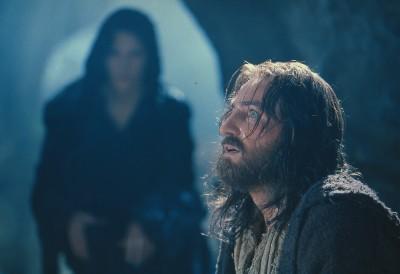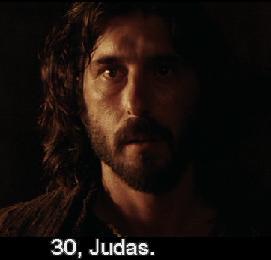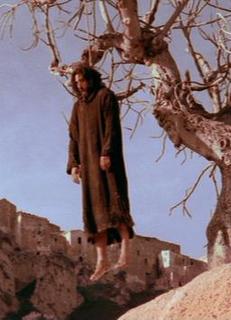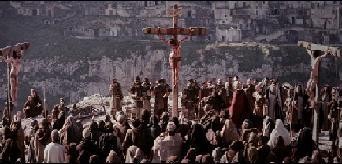Sin and Satan

Well, we had a bigger turn-out than last week. Some new faces, which is always cool! Had a lot of good discussion, too. If you missed it, here's the finer points of the topic, as usual (all 8 pages of it).
Sin
We live today in a permissive society that embraces sin as a virtue. There are the ways of God and there are the ways of the world--two very different ways for humanity to live. The communications media is often filled with the implicit message that "anything goes" and that sin is "no big deal". Sin is a big deal, however, with real and damaging consequences.
Sin is any free, deliberate behaviour on our part that we know offends God and breaks His law. People's sins are rooted in their pride, anger, envy, greed, lust, gluttony and laziness, otherwise known as the "seven deadly sins." Whereas choosing the high road can be difficult, choosing the evils of this world can be very attractive at times.
Sin is such a big deal because God, as our Creator and loving Father, deserves all of our love, respect, and obedience. But He really does not need our obedience--we do. For He loves us more than we love ourselves and knows us better than we know ourselves. So every time we say "no" to Him and His will, we damage others and ourselves. Some sin, called venial or light, weakens our relationship with God. Mortal, or deadly, sin ruptures our relationship with Him, because it is a deliberate act, in full consent of our will, saying we're going to do it our way and not God's--in effect, flipping God off. Turning away from sin and seeking His grace restore this ruptured relationship.
The Effects of Sin
Sin is so damaging is for a number of reasons. First, God is Holy, and sin is completely opposed to His holiness, and therefore sin in our lives cuts us off from Him. The Bible says that the wages of sin is death, and that if that sin in our lives is never dealt with, ultimately the result is eternity in Hell, separated from God. The other reason why sin is so damaging, and why God takes such pains to warn us away from it, is because God designed us to be holy as well, to operate a certain way. Think of it like a car. When we drive the car properly, and maintain it regularly, it'll last for a long time without any problems. But if we shift it improperly, or put the wrong kind of fuel in the tank, then the car breaks down. Now, the designer of the car didn't write out an owner's manual telling us how to look after the car properly because he didn't want us to enjoy driving, but precisely because he did want us to enjoy driving the car. It is the same with God. He gave us His law, not to be a killjoy, but to give us true joy.
We see the effects of sin on the hearts of people in the scene where Pilate presents the flogged Jesus to the crowd that we saw last week. We see a vivid contrast between a man who still has a shred of compassion left in his heart set against a seething mob whose appetites for greater spectacle can't be satisfied. Sadly, this is a perceptive portrayal of the human condition: our appetites for sin and vice, once we indulge them, grow ever stronger and can never, ultimately, be satisfied.
The Source of Sin--Satan
It can all be traced back to the fall of Lucifer, the "Angel of Light"--the devil--who rebelled against God and established his kingdom on earth. God thereafter has allowed people the freedom to choose for themselves between His way of truth, selflessness, and light, and the devil's way of lies, selfishness, and darkness. Having rejected God, the devil surely harbours immense hatred for the Creator. We also know from Scripture that he intends to wage spiritual battle against humans, God's special creation. This enmity includes desiring that humans lose their salvation. In the beginning, Satan tempted Adam and Eve into believing that God was holding out on them, and that, if they did things their own way, they could become like God Himself. Unfortunately, Adam and Eve went for it, and because of the sin of our first parents (original sin), we inherit a natural tendency toward sin.
But that is not the whole story. Satan is a master at deceitful advertising. He makes sin appear glamorous and desirable, just as he did in the Garden of Eden (Genesis 3). He tries to convince us that God forbids things, not because they are harmful, but because they will make us like Him and He wants to keep us down, subservient, under His feet. So Satan markets sin as liberating while it is the exact opposite--enslaving. Our first parents fell for it, and so do we.
 In the Garden of Gethsemane, Satan did what he could to try to discourage and prevent Jesus from accomplishing His saving mission. [Clip 1: 0:07:55-0:09:12] As Jesus prays for the strength to complete His mission, Gibson depicts Satan unleashing a serpent, which Jesus crushes under His foot. This is an allusion to the story of the first Garden, where Adam and Eve committed the first sin and cut themselves off from God. But even then, God had put in place His plan for redemption, and He promises that the "seed of the woman" (representing all humanity, and, ultimately Jesus, the "Son of Man" and representative of all humanity) will "bruise the head" of the serpent. Jesus is the "new Adam" (1 Cor 15:22), restoring what the first Adam had lost through sin. So Jesus' crushing of the serpent in this scene is used here as a foreshadowing of Christ' victory over the devil and over sin and death through His suffering, death, and resurrection.
In the Garden of Gethsemane, Satan did what he could to try to discourage and prevent Jesus from accomplishing His saving mission. [Clip 1: 0:07:55-0:09:12] As Jesus prays for the strength to complete His mission, Gibson depicts Satan unleashing a serpent, which Jesus crushes under His foot. This is an allusion to the story of the first Garden, where Adam and Eve committed the first sin and cut themselves off from God. But even then, God had put in place His plan for redemption, and He promises that the "seed of the woman" (representing all humanity, and, ultimately Jesus, the "Son of Man" and representative of all humanity) will "bruise the head" of the serpent. Jesus is the "new Adam" (1 Cor 15:22), restoring what the first Adam had lost through sin. So Jesus' crushing of the serpent in this scene is used here as a foreshadowing of Christ' victory over the devil and over sin and death through His suffering, death, and resurrection.Believing in the devil may seem passé to the supposedly "enlightened", but this is a grave mistake. As C. S. Lewis points out in The Screwtape Letters, the widespread disbelief in Satan's existence is actually an ingenious move on the part of the Evil One. If he can convince men that he does not exist--that he is only as "real" as the boogeyman--then we will not be on guard against him. And if we're not on guard against him, we will almost certainly fall into his traps, because the reality is that he desperately wants your soul.
Far from being some abstract personification of "evil," the devil is an actual spiritual being--a fallen angel (or demon). Though this idea sounds quaint or old-fashioned to modern ears, the Catholic Church has consistently taught that the devil is a real being with formidable will and intellect. Being a pure spirit, he is not subject to the laws of the physical world. His natural intellectual abilities far surpass those of human beings. Both the Bible and the Tradition of the Church teach that the devil (also called Satan--meaning "adversary", or
"Lucifer"--"Light bearer") was the most glorious of the angels, but pride and envy caused him and his followers to rebel against God. As a result of this rebellion, Satan and the other fallen angels (or demons) were cast out from God's presence, a separation that will exist for all eternity.
Given the devil's rejection of God, we can reason that he is consumed with hatred towards God and those made in God's image and likeness--humans. Satan, therefore, is surely relentless in his desire to have you and me lose our souls and be separated eternally from the God who loves us. In the movie, and particularly in the scene in the Garden, his aim is to derail Christ's mission on earth--a mission of love, truth, and salvation.
Jesus refers to the devil many times in Scripture. For example, in Matthew 25:41, He condemns those who refuse to follow His will and love their neighbour with the words, "Depart from Me, you cursed, into the eternal fire prepared for the devil and his angels." In these words, Jesus joins the fate of those who refuse to do His will with that of the devil--namely, hell. The apostle John makes the essential mission of Jesus clear in his first letter: "The reason the Son of God appeared was to destroy the works of the devil" (1 John 3:8).
[Clip 2: 0:54:25-0:54:55] In the movie, the devil is present at Jesus' scourging. We see Satan holding a grotesque demon baby in his arms and swirling around the action of this sequence, inciting the torturers to maximum violence and brutality. This was the devil's moment, in which he thought he was winning the battle with God. [Clip 3: 1:01:00-1:02:00] He is depicted with the baby demon as a sort of "anti-Madonna-with-Child" image. The devil wants to corrupt anything that is good and beautiful. The devil taunts Jesus, while His Mother stands by helpless, and His Father appears to have abandoned Him. However, despite appearances, none of these things are true, for we know that it was precisely in Jesus' suffering, death, and resurrection that He won the battle.
Even Mary's apparent helplessness accomplishes much in the Divine Plan. Catholics recognise Mary's obedience to God as the antithesis of the devil's rebellion against God. This is a shock to many people, who think that the devil is the opposite of God. But nothing is the opposite of God, for God has no equals. Nor, apart from God, could Mary be the devil's opponent since the devil, as an angel, is vastly more powerful than any human being, naturally speaking. But Mary is "full of grace" as Gabriel called her. She is full of the life of God and is therefore able to confront the devil [Clip 4: 1:14:15-1:14:45], not only during Christ's Passion, but for our sake as well, now that she is glorified in heaven. Mary's "yes" to God stands in direct opposition to Lucifer's rejection of God's will. We'll discuss this in greater detail in the final week of the series.
Satan's Power
As we said, the devil is powerful, but unlike God, he is not all-powerful. There are definite limits to what he can do. For example, he can tempt us to sin, but he cannot cause us to sin. "The devil made me do it!" is not a valid excuse for our sins. There are times, however, when the devil can "possess" a person and have a certain degree of control in their lives. This notion, made popular in horror movies like The Exorcist, is often blown out of proportion. In order for the devil to possess someone, that person needs to invite him in willingly. However, as the Father of Lies, he might use the bare minimum excuse as an invite. This is a major reason that the Church warns so vehemently against things that are from the occult, like Ouija Boards, or Tarot Cards. But even in a case of possession, God is still more powerful, and repeatedly in the Gospels we hear of Jesus driving demons out of people. What's more, He promised that we would have that same authority as His followers.
The extreme case of possession aside, the primary way that the devil attacks us is through tempting us to sin, and leading us away from God. The greatest example of such a person is Judas Iscariot, the guy who betrayed Jesus [Clip 5: 0:10:25-0:10:51]. Scripture actually tells us very little about him besides his name and his role as the apostles' treasurer. After betraying Jesus, he was seized with remorse and committed suicide by hanging himself.
Judas

"Iscariot" means "dagger," which is an interesting name in light of his role in betraying Jesus--"stabbing Him in the back," so to speak. It is also believed that his family was from the town of Kerioth in the south of Judea.
From the parts of the Bible that do talk about Judas, we can find out a little bit more about who he was. He seemed to be very concerned about "earthly" things, such as power and money. He rebuked Mary of Bethany when she anointed Jesus' feet with expensive perfume. Judas griped that that money should have been used for the poor. But St. John tells us that Judas' concern wasn't really for the poor, but that he looked after the money, and used to steal some of the contributions from the money bag (John 12:6).
Besides being motivated by money, Judas seems to have expected Jesus to be a different kind of Messiah, a worldly one who would free Israel from the bondage of its Roman oppressors. Having witnessed Jesus' miracles, it is possible that Judas believed in Jesus' divinity, or at least grasped that He was a prophet. It is sometimes thought that Judas turned Jesus over to the authorities to force His hand--to cause Jesus to exercise His authority and restore the Jewish nation to earthly glory.
[Clip 6: 0:31:45-0:32:35] Judas seems to have felt remorse for his betrayal of Jesus, because, as we see in the film, he throws the 30 pieces of silver he was paid to betray Jesus on the floor of the Temple (see Matt 27:5). He even says to the priests and scribes with whom he collaborated, "I have sinned in betraying innocent blood" (Matt 27:4). This shows that Judas wasn't totally without conscience. Even so, this remorse was not followed by the virtue of hope--a hope that he could be forgiven [Clip 7: 0:15:30-0:16:11].

The Bible reveals that after he cast the 30 pieces of silver on the Temple floor he went out and hung himself (Matt 27:5). Mel Gibson portrays him as being in the throes of demonic torments that plague him and drive him farther from God.
[Clip 8: 0:32:35-0:33:48; Clip 9: 0:35:40-0:37:50]. He could have become a great saint had he recovered from his sin as Peter did. Instead, he despaired of God's mercy and chose death.
"Good Thief" vs. "Bad Thief"

There are two more people to consider when it comes to the topic of sin. The two people who were crucified with Jesus illustrate both the effects of sin, and also the possibility of forgiveness and reconciliation. The "Bad Thief", whom Tradition has named Gesmas, lets his sinful life make him bitter. His sin has taken so much control of him, that he is blinded to the truth that is Jesus. He mocks Christ just as much as anyone else. Unfortunately, Gesmas' fate is all too common. Sin takes us down a road that gets farther and farther from God. While it is true that He can forgive any sin as long as we're willing to let Him, the very act of sinning, and living a sinful lifestyle, hardens our heart to His love and forgiveness. In contrast, the "Good Thief," Dismas, realises the truth, and even though he was a terrible criminal himself, his heart is still soft towards the things of God, and that is all God needs to bestow His love and forgiveness. Jesus' love and forgiveness of His torturers and murderers touches the thief's heart, and he humbly asks Christ to forgive him [Clip 10: 1:44:20-1:44:50; Clip 11: 1:45:00-1:46:15]. The "Bad Thief" scorns this humble act as a futile gesture of a desperate fool, and subsequently has his eyes gouged out by a crow, an event in the movie which echoes historical facts (carnivorous birds would often peck at crucified victims' eyes to make sure they were dead before trying to eat them) but also symbolically demonstrates his spiritual blindness.
The fate of the "bad thief" is contrasts with that of the "good thief," who in the Bible professes belief in Christ at the eleventh hour and is assured by Jesus a share in His Kingdom. The forgiveness of Dismas by Jesus gives all Christians hope in the saving power of faith. Even at the hour of death it is possible to ask for and receive forgiveness of one's sins by trusting in Jesus!
The forgiveness that Jesus won on the cross, as we discussed in detail last week, is available to everyone. That is why Jesus cried out when He was being crucified, "Father, forgive them!" [Clip 12: 1:38:00-1:38:20] Jesus' desire to forgive us and wipe out sin extends even to the very people responsible for His death! And we know we can be forgiven, because the Devil was defeated on the cross [Clip 13: 1:55:10-1:55:25]! The Bible says, "Even when you were dead in transgressions, He brought you life along with Him, having forgiven us all our transgressions; obliterating the bond against us, with its legal claims, which was opposed to us, he also removed it from our midst, nailing it to the cross; despoiling the principalities and the powers, He made a public spectacle of them, leading them away in triumph by it" (Colossians 2:13-15).
How Do We Gain Forgiveness?
During the discussion yesterday, the question was asked how we know we are forgiven. In my last blog, we discussed baptism as the means that God provided for us to enter into His Covenant--His family--and to have our sins washed away. That's the first step any of us takes, and many of us take it as babies (not me, though. I was 16).
But what about the inevitable times afterwards that we will be tempted and buy into it? How are we forgiven then? The Bible tells us that if we confess our sins, God is faithful and just to forgive us (1 John 1:9). In most circumstances, we can just apologise to God with a sincere heart. These are the cases of venial sin, as we mentioned up above. We have means to go straight to God because our sins are of such a nature that, while they harm our relationship with God, they do not sever it completely. This is because a venial sin isn't done with the desire to sin, to flip God off, as it were, but was done in the heat of some passion and not with our full, reasoned consent. However, continuing to surrender to our passions in venial sin will continue to damage the relationship to such a point that it becomes mortal, or deadly, to our relationship with God.
Mortal sin is the kind of sin we do that is fully a result of our reasoned choice and understanding. We know it is wrong, and we still very much want to do it, consequences be damned--or rather, the consequences would be damnation. This sort of sin severs our relationship completely with God, in such a way that if it is never dealt with, we are in effect no longer Christian. As such, our forgiveness requires a more drastic approach in order for us to reenter the community. That is why Jesus provided us with the Sacrament of Reconciliation (or Confession or Penance). It is in this sacrament that we have the means to restore ourselves to the Covenant which we violated by our sin.
Jesus instituted this sacrament after His Resurrection, when He told His 12 Apostles, "'Peace be with you. As the Father has sent Me, so I send you.' And when He had said this, He breathed on them and said to them, 'Receive the Holy Spirit. Whose sins you forgive are forgiven them, and whose sins you retain are retained'" (John 20:21-23). St. James wrote in a letter about this sacrament and one other, the Anointing of the Sick. Regarding Confession, he writes, "He should summon the presbyters [of which "priest" is an English contraction] and they should pray over him....If he has committed any sins, he will be forgiven. Therefore, confess your sins to one another and pray for one another, that you may be healed" (James 5:14-16). James ties the two sacraments together in his letter, but Sacred Tradition separates the two into distinct, but often overlapping, sacraments.
In the sacrament of Reconciliation, we can know we are forgiven because we know by faith that this is the means that Jesus set up for us. Therefore, when we hear the words of absolution by the priest, they can minister to our heart in a way that might not have been the case up to that point. It's one thing to know something with our heads (God loves us and forgives us) or to read it in a book, even the Bible. But in sin, the devil (that jerk) tries to keep us from believing that forgiveness is possible, just like he drove Judas to despair and suicide. So when we, in the throes of guilt, try to reach God on our own, heaven can feel very far away. The beauty, then, of confessing our sins to a priest, gives us the opportunity to hear the words as though from Christ Himself, as the priest stands in His stead.
Furthermore, if you have a good priest, he can help you to find the root of your sin, so that you can more ably dig it out. Thus, Confession can be a mini counselling session. The third thing that Confession does is give us the first step in Repentance, which is turning 180 degrees from sin and going back to God. The Penance that the priest assigns is designed to counter the sinful act and show us the first step back to living the holy life. But by far the most important thing that the Sacrament of Reconciliation does is to humble us. It's a very easy thing to keep our sin between us and God. No one else has to know. But in Confession, we must openly admit our sins to a priest, and this is very difficult. But it is important, because the very act of Confession attacks the deadliest of the Seven deadly sins--the very sin that caused Satan's downfall--Pride.
Through the Cross, Jesus makes forgiveness available to all. He gave His Church the means of Grace and Forgiveness so that we may be members of His Covenant Family. So then, as members of His Family, where do we go from here? We'll discuss that next week as we look at some of the characters in The Passion of the Christ who had a life-changing encounter with Jesus, and see that our lives should tell a similar story of radical change!
God bless.
Labels: Confession, Satan, Sin, St. Andrew's, The Passion of the Christ

0 Comments:
Post a Comment
<< Home